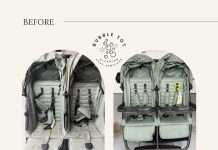
Smooth like a baby’s skin. We’ve all heard this phase. We’ve also heard the pitch from brands targeting parents, that their products are suitable for the baby’s sensitive skin. More often than not, our babies’ skin is silky soft, but it is also ultra-sensitive. In many cases, our babies would get some sort of bumps or rashes either localized or full-bodied. I’ve been one of those moms, asking in mom groups and searching high-and-low for answers to what those skin rashes are, and why they are occurring. It very quickly became evident to us that our LO’s skin rashes were a result of eczema. We were also aware of eczema as one of our LO’s grandparents has life-long eczema. Fortunately, not every baby who has skin rashes or bumps has eczema. We turned to our friend, renowned allergist and immunologist Dr. Sanjeev Jain from Columbia Allergy, to clear up some of the muddled information surrounding baby skin conditions.
What is the difference between diaper rash, fungal infection, heat rash, psoriasis, and eczema?
Heat rash often occurs after a child is exposed to increased temperatures and sweating from situations like hot days or exercise. This rash will typically occur in areas with folds like the neck, groin, armpits, behind the knees, and in the elbow creases. The rash will typically occur as pinpoint vesicles with a red base. This rash will typically improve after cleaning the skin and with cooler temperatures, although it can become infected and require additional treatment to clear up.
How does diet affect baby skin? Which foods or environmental particles are common eczema triggers?
Common eczema triggers include dust mites, grasses, tree pollens, harsh soaps and detergents, scented beauty products, products that dry out the skin like hand sanitizer, and foods like milk and egg.
Why is eczema a life-long condition in some and others quickly outgrow it?
Eczema is an immune-mediated condition that many children are diagnosed with. Within the first few years of life, the immune system undergoes large changes. As a result, some children may be able to outgrow eczema as their immune system matures and self-regulates. However, those whose immune systems are not able to correct the abnormalities will continue to experience eczema symptoms on and off especially after being exposed to triggers like stress, illness, and allergens.
Can perfume or makeup trigger or worsen eczema?
Patients with eczema have an immunologic disorder that results in a disrupted skin barrier, so the use of any topical products like makeup or exposure to chemicals like perfume scents can cause a worsening in symptoms. When these foreign substances come in contact with the skin, the immune system may detect an invader and respond by creating increased inflammation leading to more itching and dry skin. It is recommended that patients with eczema stick to fragrance-free products and avoid makeups that contain ingredients that can be irritating to the skin.
How do I achieve the balance of helping my baby strengthen their immune system and preventing eczema triggers?
As the immune system is developing, we want to intentionally introduce different organisms to the immune system as this is a crucial step in developing a baby’s immune system. These organisms include pollens, bacteria, viruses, foods, and more. However, after a known allergen or eczema trigger has been identified, it is best to avoid the trigger and not stress the immune system. Babies who have food triggers for their eczema may benefit from food avoidance or allergy desensitization treatments like sublingual immunotherapy (SLIT). Babies who have environmental triggers for their eczema can benefit from precautions taken within the home to reduce exposure to allergens. Hypoallergenic bedding and pillow covers, washing bedding on hot, using an air purifier and vacuum with a HEPA filter, and keeping windows closed during periods with high pollen counts can help reduce exposure to allergens found within the home such as dust mites, pet dander, and pollens. Keeping windows closed on days with high pollen counts can also help reduce exposure.
The information on this website is not intended or implied to be a substitute for professional medical advice, diagnosis, or treatment. All content, including text, graphics, images, and information, contained on or available through this website is for general information purposes only. Always seek the advice of your physician or other qualified health care provider with any questions you may have regarding a medical condition or treatment and before undertaking a new health care regimen. Never disregard professional medical advice or delay in seeking it because of something you have read on this website.



















